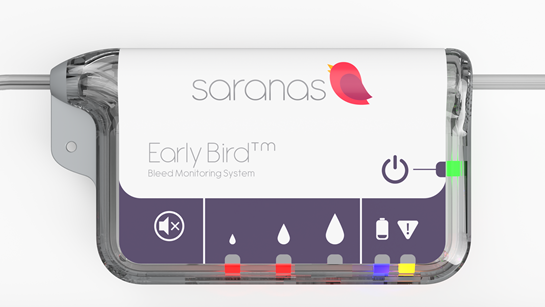Texas Heart Institute Conducting New Clinical Trial to Test Innovative New Early Bird™ Bleed Monitoring System

The Saranas-Owned Technology was invented at Texas Heart Institute.
November 20, 2018 (Houston, TX) – Texas Heart Institute is currently enrolling patients in a new clinical trial designed to test the safety and efficacy of a novel device that allows for the early detection and monitoring of bleeding complications associated with vascular access procedures. This new technology – Saranas’ Early Bird Bleed Monitoring System – was invented at Texas Heart Institute (THI) by Dr. Mehdi Razavi, Director of THI’s Electrophysiology Clinical Research & Innovations department.
The Early Bird utilizes a sheath – a plastic tube device that helps keep arteries and vessels open, so catheters and other devices can be inserted during surgical procedures – embedded with sensors that measure the electrical resistance across a blood vessel. By sensing a change in the vessel’s electrical resistance, the Early Bird is designed to detect and monitor bleeding from a blood vessel accidentally injured during endovascular procedures, such as transcatheter aortic valve replacement (TAVR), large bore hemodynamic support device placement, or other complex endovascular interventions where the femoral artery or vein is used to gain vascular access.
“As the field of minimally-invasive, catheter-based procedures continues to advance, so must our monitoring capabilities and detection techniques,” said Dr. Razavi. “Ensuring patient safety and continuing to have more and more positive outcomes from these procedures is critical. The Early Bird device provides rapid detection of internal bleeding complications and will enable physicians to immediately respond and help to avoid costly and even life-threatening bleeding complications.”
When the Early Bird device senses a change in the electrical resistance across a blood vessel, audible and visual notifications are triggered to immediately alert the healthcare team to potential internal bleeds. If detected early, bleeds can be stopped or even prevented, which can help to decrease procedural complications, healthcare costs and the length of stay in the hospital after a procedure.
“The Early Bird is a promising new device that I believe will significantly advance our monitoring and response capabilities during procedures,” said Dr. Joggy George, Principal Investigator of the study and THI professional staff member. “As it stands now, bleeding remains the Achilles’ heel of advancing non-invasive care modalities that require large bore vascular access. The Early Bird will play a crucial part in allowing us to monitor for bleeding in real-time and making these procedures safer in the future.”
The multi-site clinical trial is anticipated to last approximately five months in duration and will enroll up to 100 patients in total. Eligible patients must be 18 years or older, be willing and capable of signing an Informed Consent form and be undergoing a planned large-bore endovascular procedure. The Early Bird Bleed Monitoring System is not yet cleared by the U.S. Food and Drug Administration and is currently available for investigational use only.
###
About Texas Heart Institute
The Texas Heart Institute (THI), founded by world-renowned cardiovascular surgeon Dr. Denton A. Cooley in 1962, is a nonprofit organization dedicated to reducing the devastating toll of cardiovascular disease through innovative and progressive programs in research, education and improved patient care. More information about THI (@Texas_Heart) is available at www.texasheart.org.

.svg)


